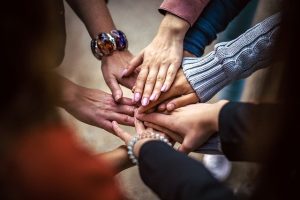by Jenny Rose | Nov 19, 2022 | A Flourishing Woman, The Journey
I was taught, as a child, it was my job to alleviate distress. One must always respond immediately and help the sufferer. It went far beyond duty and obligation. If I did not fix the distress of others, my childish world would fall apart. Everyone would leave.

Photo by Cristian Newman on Unsplash
For a child, such consequences are death.
I was also taught “help” meant doing anything and everything I was asked to do, immediately, unquestioningly, and unendingly. My own distress was of no consequence at best and a direct threat, an unwelcome competition, at worst.
That core teaching stayed with me as I grew up, and has been a keynote of my behavior and experience most of my life. I wanted to help people. When people around me suffered, I felt an overwhelming, painful panic, as well as complete responsibility. I had to do everything I could, give the situation my all in order to “help.”
I also grew up with an inability to respond to my own distress. Hunger, thirst, fatigue, emotional and physical pain, were all ignored. My disconnection from my own needs and experience led me into chronic pain, eating disorder, depression, and anxiety. I was unaware of my traumatic wounds. I had no interest in helping myself. Helping myself was selfish, bad, and unloving.
Then I studied emotional intelligence and all the work and therapy I’d done over the years with guides and teachers as well as on my own (see my Resources page) wove together into an intention to reclaim my health and my self.
This blog has been a key part of that work.
I still don’t like to watch people suffer, but I’m more careful now about “helping.” I’ve learned suffering is not necessarily the enemy. We get ill, have painful emotional and physical injuries, have uncomfortable feelings. We age and our bodies and sometimes our minds wear out. To be human is to experience these things; they’re inescapable. We can’t control what happens to us, but we can control how we deal with such events. When someone is suffering, I’ve learned to be less reactive, to remember it’s not my fault or my responsibility to fix it. I’ve learned to notice whether the sufferer is helping themselves before I jump in.

Photo by Joshua Earle on Unsplash
I have learned a bitter lesson: No one can help someone who will not help themselves.
I realize now we can’t always go back to where we were before we were wounded; we can’t always heal the wound itself. Sometimes our wounds and suffering are taking us into something new and what’s called for is not healing, but tolerance and patience.
What does “help” mean? This is an important question. Does help mean we respond promptly to all demands, whether or not they are safe, sustainable, or even possible? Does help mean we make thoughtful, intentional choices for safety and practicality even if those choices go against what we are being asked to do in terms of “help?” Do we decide what the best “help” is, or does the sufferer get to choose what kind of “help” they want?
I’m still uncomfortable talking about my own pain. Honestly, I’m still uncomfortable even noticing it, but I practice every day at staying present with how things are with me. It feels selfish and wrong, but I know that feeling doesn’t mean it is selfish and wrong, just that it’s very different from my early training. Sometimes the choice that feels worst is the best choice. Sometimes suffering is the only possible road forward into peace, growth and resilience.
None of us has the power to help anyone avoid suffering. I confess I’ve argued with that reality all my life, but it hasn’t done a bit of good. In fact, it’s done harm, most of all to myself.
I have occasionally, in the depths of anguish, asked for help. When I do that, what am I asking for?
Nothing tangible. Not money or a thing. Not love. Not sex. Not a gallon of ice cream. I’m not asking for someone to come along and fix it all, or take responsibility.
I’m asking to be heard. I’m asking for someone to say, “I’m here. You’re not alone. I believe in you. I know your goodness, your strength, your courage.” I’m asking for a safe place to discharge my feelings. This might involve snot, wet Kleenexes, rage, and a raised voice.
A safe place is not a place where someone else takes responsibility and fixes, or asks me to stop feeling my feelings, or is clearly uncomfortable with my suffering. A safe place is provided by someone with healthy boundaries who is willing to witness my distress without feeling compelled to fix it.
Witness. A witness. That’s ultimately what I want. Just someone to be there with me for a little while. I can face my own demons and challenges, but I can’t do it all alone.

Photo by Gemma Chua Tran on Unsplash
None of us can. We are social animals. But we can witness for one another. We can sit quietly, holding a safe space without judgment or a fix or advice, and just witness. Pass the Kleenex.
It’s the hardest thing in the world for me to do. Simply witnessing seems so passive, so weak, so useless. Someone right in front of me is deeply distressed and I simply sit like a bump on a log witnessing? Are you kidding me?
Surely, I can do better than that. I can do more than that. It’s up to me to make their suffering stop!
And yet. And yet. Isn’t finding a witness incredibly hard? How many people in our lives can take on such a role? What an inestimable gift, to be willing to walk beside someone who is suffering, to be willing to stay, to not look away. What if our boundaries were so healthy we could do that? What if we weren’t afraid of suffering? What if we were wise enough, strong enough, to make room for it and sit down beside it?
Someone I love is in great anguish of spirit. They beg me for help, but a very specific kind of help which is ethically and practically impossible for me or anyone else to give. Which makes me an enemy. Which makes my loved one even more alone than they already feel, more victimized, more powerless, more confused.
There is nothing about this that doesn’t suck. I dread the phone calls beyond words because I don’t want to witness this suffering. It feels unbearable. But my loved one must bear it, and if they have to, I can. I choose to witness. It feels like nothing. It’s not what’s wanted. But at this point it’s all I can do. So I will keep calling and answering calls. I will get up in the morning and talk to case managers, nurses, CNAs, palliative care consultants, nursing homes, and whoever else will talk to me. I will update friends and family. Then I will get up the next morning and do it again.
I pray there is some power in witnessing, some rightness. I pray that somehow my love and willingness to remain a witness does a little bit of good, provides some small comfort, lights a candle in the darkness of dementia, even for a moment.
And I search inside my own suffering for wisdom, for healing, for grace, and for faith.
To read my fiction, serially published free every week, go here:
by Jenny Rose | Nov 6, 2022 | Boundaries, Connection & Community, Emotional Intelligence
I’m sitting at my desk this morning, the sun shining on the wet grass scattered with wrinkled leaves outside my window. I’ve just been running errands. My desk, unusually, is piled high with scraps of paper, notebooks, my calendar, receipts, to-do lists, and a new binder and paper I just bought to help me organize. My big grey tabby, Oz, is busily knocking everything off the desk and chewing on a new plastic package of AAA batteries because I won’t let him lie on the keyboard.

Photo by Joanna Kosinska on Unsplash
I was sick most of October. I’m finally on antibiotics; I can breathe, and consequently think, more clearly. A week ago an aged family member living halfway across the country with whom I have a lifelong troubled history became openly unable to manage their life and then fell and broke their hip in quick succession.
Sometimes life requires us to muster every bit of learning, wisdom, strength, courage, insight and experience we have in a catastrophic practical test, like a nightmarish pop quiz. This is one of those times. It helps to look at it that way, because I know I have (somewhere) everything I need to manage this situation with all my considerable compassion and clear-sightedness.
This last week I let go of everything. My living space needs to be cleaned. I desperately want to change my sheets after so many nights crying, coughing, and trying to breathe adequately enough to snatch some sleep. I’m longing to escape my phone and laptop, sit in the sun, read, relax, do some gentle gardening (still like late summer here in Maine). I haven’t even started on this post yet, a thing I usually do during the week.
I made it to work. I made it to the doctor for antibiotics. I stayed hydrated. Aside from reactive crisis intervention and coming to terms with what’s happening long-distance, that’s about all I can say for myself. But now, at last, I’m beginning to stir feebly into some kind of normal experience again.
It’s a relief.
I opened this document and started typing without any plan whatsoever. I don’t have to post today on this blog. It wouldn’t matter if I didn’t. I suppose I’ve grown used to the opportunity to organize my life into words every week.

For nearly a decade I’ve worked intensively on boundaries. Ten years ago I knew nothing about personal boundaries. My life was accordingly dysfunctional. It was hardly my life at all, in fact. It was everyone else’s life. I’ve written extensively about boundaries on the blog, and the concept of the difference between your experience and mine is woven heavily into my fiction. I’ve practiced building and maintaining healthy boundaries in the last years, though I’m still far from perfect in working with them.
But I’m getting better all the time.
When we are prevented from building appropriate psychological boundaries as children, we never create an internal world in which we can rest, center, and ground. We become an image in someone else’s mirror, a paper doll, a nonperson.
Nonpeople have no needs, no credibility, and no permission to express themselves as individuals. It’s worse than no permission, though. Nonpeople are severely punished for any independent feeling, need, or expression. Nonpeople have no private life. They’re not allowed to say no.
This kind of relationship, sadly, is often invisible to onlookers. From the outside, such connections look bonded and mutually adoring. The public view never sees the anguish involved in a relationship without boundaries.
Anguish on both sides. Those who seek to prevent others from having boundaries are deeply damaged, insecure people whose own boundaries were likely brutally violated and torn down. They are terrified of being alone, and a boundary makes them feel utterly outcast and rejected.

Photo by Nicole Mason on Unsplash
But for me, boundaries are sanity. They’re safety. They allow the power to choose and respect to flow both ways. They say, “My self is worthy. Your self is worthy. We can choose to love one another as well as ourselves.”
Reshaping a primary relationship with no boundaries into one with healthy ones is excruciating. It may not be possible. I haven’t decided it is impossible, but I wonder. One of the hardest things about it is how it looks to outsiders, who don’t understand why all the harsh edges and corners are suddenly showing in such a perfect, loving relationship, the kind we all want, the kind we should feel lucky to have.
Another feeling I’m present with just now is the nauseating swing between relief and guilt. All secrets, painful family secrets included, have an uncomfortable way of being revealed. Even if everyone involved conspires to keep the secret, eventually, often in a you-couldn’t-make-this-stuff-up kind of way, someone or something like a terrible series of events exposes it.
I’ve posted about such ideas as loyalty, responsibility, duty, gaslighting and projection. The bars of prisons built by family systems are forged out of concepts and strategies like these. But when a secret escapes the bars melt away and we’re suddenly free. We’re not alone in solitary anymore.
Some stranger says to us, “Oh, yes. I’m familiar with that dynamic. I’ve observed that behavior. I understand,” and we realize we are not crazy. We are not mean and ugly. We are not hateful.
We are not alone.
The relief of validation is indescribable. So is the guilt accompanying the relief. When we guard secrets, literally with our lives, for the sake of protecting the dignity of a loved one and the secrets are revealed through no fault of our own, we also feel exposed. The mere fact that we were the designated secret keeper means we failed.
Our love and the cost of bearing the secret’s burden for so long doesn’t matter. The least we can do, the least we can do, is remove all the boundaries we’ve erected so carefully and painstakingly and once again give up our lives, our freedom, our selves. Our loved one’s anguish should become our anguish, their pain our pain, their limitations our limitations. If necessary, their death should be our death. Because we betrayed, we let them down, we failed.
The secret got out.
I can’t see very far ahead. It’s not useful to gaze at the road behind. I’ve already walked it and everything is different now, the people involved and the situation. Right now I know where I am. I can see the next steps. This is a new path, one I’ve never taken before. It’s a new script, a new experience. I’m working on releasing my assumptions. I don’t know what will happen next. I can predict, but predictions make me tired. What I have is right now, today. I know what I will do today, both in my personal life and to manage my loved one’s situation.
This time I will find a way to inhabit my boundaries and support my loved one without sacrificing one for the other. I will make phone calls, send emails, get myself organized to do whatever I can long distance and prepare to travel in case of need. I will grieve.
I will also write, get outside, do some laundry, maybe take a nap, and work on recovering my health, because mine is the only life I can live.
To read my fiction, serially published free every week, go here:
by Jenny Rose | Sep 24, 2022 | A Flourishing Woman, The Journey
As I’ve thought about this post, I realize the theme of being lost and found is a thread running through my life and my writing. Years ago, when I was first introduced to Clarissa Pinkola Estes and devouring everything I could find by her, she used a phrase I’ve never forgotten: everything lost is found again.
Everything lost is found again.

The possibility of that truth gave me deep comfort, something I badly needed in those days.
Maybe we don’t find all the things we lose in our lifetimes, and maybe not in our deathtimes. But maybe someone else finds what we lost. Or maybe what we lost comes back to us looking so different we don’t recognize it. Or maybe what we lost is not truly lost at all. We carelessly leave things behind, or we amputate them, or we deny they were ever there in the first place. We fear we’ve lost them. We try to lose them. But maybe they never really leave us, they just hide somewhere in the attic of our minds until we need them. We ascend the stairs, enter the musk and debris of years, all the broken, aging, outdated and rejected parts of our lives and ourselves mouldering together in cobwebs and dust.
I like to imagine that.
I’ve posted before about being lost and found. I went back and read it as I worked on this post, so as not to be repetitive. That post was a seasonal meditation on the nature of change. I didn’t explore it quite from the angle of losing to find.
I came across a quote recently from Kristin Martz: “We lose ourselves in the things we love. We find ourselves there, too.” It made me smile, and think about the parts of my life so deeply absorbing I am self-forgetful as I live them. My head is empty. I am pure being, without self-consciousness or anxiety. Time does not exist. I feel a kind of boundary ecstasy, an awareness of connection to everyone and everything, an essential and lovely part of some greater whole.
Perhaps during such times we lose all the crust, the armor, the accumulation of useless and punishing junk we’ve somehow picked up or been taught, and are pared down to who we really are in our souls and spirits.
Many of us don’t want to let go of our junk, though. It’s been with us so long it forms part of our identity, part of our story, and we don’t want to let it go. Then who would we be? How would we recognize ourselves? What might change? What different or challenging things might we be required to do? We don’t take the leap into anything we might lose ourselves in, so we never fully find ourselves, either.

Photo by David Hofmann on Unsplash
Maybe the times in life when we truly feel we’ve lost it all are also the times we’re finding unimaginable grace and meaning.
It’s a circle, a natural life cycle, an ebb and flow of experience.
Another thing I came across somewhere years ago is the idea of an older, wiser version of ourselves, always at our shoulder supporting, advising, guiding, and cheering us on as we journey through our lives. I often make a picture of it in my mind, myself as an old (well, older!) crone, holding my hands out to a younger, struggling self the same way I hold my hands out to children I’m teaching to swim.
“You can do it. I’m right here. I won’t let go of you. You’ve got this! Now … swim!” Or jump. Or put your face in the water.
“Risk,” my elder self says, “dare, follow your heart, do what you need to do for yourself. Go ahead, write, it, dream it, imagine it, enjoy it. Be happy. Play. Rest. This is the way forward.”
And, “I believe in you.” That’s what I most long to hear.
I know it’s terribly cliched, but lately I’ve been thinking about what life means. Does it mean anything? Can anyone say what it means, or must we all make our own meaning? I lean toward the latter. I’ve wondered before what life is for, what I am for, but always in soul-dark times. This is not a dark time for me. In fact, I’m gradually coming back into the light. Now the question is a curiosity, a toy, and my answers are not concrete, not a vehicle for getting through another day, but more intuitive and less formed into language.
I keep going back to that quote: “We lose ourselves in the things we love. We find ourselves there, too.”
Losing everything to find something. There’s some kind of deep truth in that my intellect can’t quite grasp, but my spirit does.

Photo by Cristian Newman on Unsplash
I wonder, with an inward smile, if that’s not my answer for the meaning of life. Finding myself, however that happens. Paring away all the scar tissue and junk, losing and losing and losing the people and places I thought were part of my identity, along with objects, money, youth, innocence, and countless other small, ordinary losses we all experience until the best, most extraordinary me is revealed. Wouldn’t it be ironic if the meaning of life is nothing more than to immerse ourselves in it, cherish our physical experience and pleasures, give ourselves to those activities in which we lose ourselves …
… and find ourselves?
No philosophy. No agonized handwringing or intellectual labyrinths. Just body, soul, joy, and loss. And discovery on the other side of loss.
Maybe the meaning of life is simply to live.
by Jenny Rose | Sep 17, 2022 | Connection & Community, Emotional Intelligence
It’s in the moment we take our eyes off the road and the car in front of us to reach for our water bottle that it happens.
It’s in the moment we’re preoccupied with our distress over a fight we had with a loved one before we came to work that we miss something key in the meeting.
It’s the moment of emotional reaction, the moment of distraction, the moment in which we’re trying to manage our feelings that provides an opening for accident, miscommunication, injury, even violence.
Windows are openings in boundaries, in walls and barriers and closed, airless cells. They allow egress and entry, movement. Sometimes air, sunshine, and birdsong come in and our best selves go out. Sometimes monsters and demons crawl in and our worst selves go out.

Photo by Craig Whitehead on Unsplash
Predators of all kinds look for windows, openings in our defenses, in our boundaries. Windows that can be cracked, wedged, broken, pried. Their tools are ideology, lies, personal attacks, misdirection, denial, silencing, and threats.
If our emotions can be controlled, if distrust and drama can be manufactured, if we can be put on the defensive, our windows become open holes. We are no longer able to open and close them at will, control what comes in and what goes out.
When our ability to think critically and be proactive is overwhelmed by our reactions and defenses, we cannot make thoughtful choices. We no longer have the energy and presence to look, listen, feel, and think about what we’re hearing or seeing. Our emotions hold us captive, and whoever controls our emotions has our power.
Emotional manipulation is seductive. We become attached to exercising our outrage. Our fear is addictive, so addictive we employ denial and cling frantically to what we want to believe, what we want to hear.
Predators need not show their work, cite their sources, or back up their assertions. They need not tell the truth or undergo the tension of collaboration and cooperation. They don’t need to waste their time with civil discourse, learning new information, or considering other points of view.
All they need is a lust for power and an open window. Like the screen you’re reading this on.
Oppositional energy and inflammatory language are short cuts, toxic mimics for true discourse and contribution. They provide a hiding place for those hunting for power and control, those unable to think critically or master information.
If we’re busy arguing, defending, and being distracted by our emotional hijack, we can’t evaluate situations and people clearly. If we can’t get a grip on a situation, perhaps somewhere in the background a predator has jimmied a window or two and successfully invaded our house.
Toss them out.
And then let’s repair our windows.

Photo by Henry Be on Unsplash
by Jenny Rose | Aug 27, 2022 | Connection & Community, Emotional Intelligence
A little over three years ago I wrote a post titled “Questions Before Engagement.”
Since then, the world has changed, and so have I.
I’m not on social media, but my biggest writing cheerleader is, and he tells me people are talking about how to recognize red flags. He suggested I post again about problematic behavior patterns.
A red flag is a warning sign indicating we need to pay attention. It doesn’t necessarily mean all is lost, or we’ve made a terrible mistake, or it’s time to run. It might be whoever we’re dealing with is simply having a bad day. Nobody’s perfect.

Image by Gerd Altmann from Pixabay
A persistent pattern of red flags is significant. Ignoring problematic behavior sets us up to get hurt.
The problem with managing red flags is we may be flying several ourselves, and until we figure out our own behavior we’re going to struggle to deal effectively with others.
We all have an excellent built-in system alerting us to possible danger. We call it intuition, going with our gut, or having a hunch or a feeling. We may not know why we feel uneasy, but we subconsciously pick up on threatening or “off” behavior from others. The difficulty is we’re frequently actively taught to disregard our gut feelings, especially as women. We’re being dramatic, or hysterical, or a bitch. We’re drawing attention to ourselves, or making a scene. What we saw, heard or felt wasn’t real. It didn’t happen, or if it did happen, we brought it on ourselves.
We live in a culture that’s increasingly invalidating. Having a bad feeling about someone is framed as being hateful, engaging in profiling, or being exclusive rather than inclusive. Social pressure makes it hard to speak up when we feel uncomfortable. Many of the most influential among us believe their money and power place them above the law, and this appears to be true in some cases. In the absence of justice, we become apathetic. What’s the point of responding to our intuition and trying to keep our connections clean and healthy when we can’t get any support in doing so?
If we grow up being told we can’t trust our own feelings and perceptions, we’re dangerously handicapped; we don’t respond to our intuition because we don’t trust it. We talk ourselves out of self-defense. We recognize red flags on some level, but we don’t trust ourselves enough to respond appropriately. Indeed, some of us have been severely punished for responding appropriately, so we’ve learned to normalize and accept inappropriate behavior.
So before we concern ourselves with others’ behavior, we need to do some self-assessment:
- Do we trust ourselves?
- Do we respond to our intuition?
- Do we choose to defend ourselves?
- Do we have healthy personal boundaries?
- Do we keep our word to ourselves?
- Do we know how to say both yes and no?
- Do we know what our needs are?
- Are we willing to look at our situation and relationships clearly and honestly, no matter how unwelcome the truth might be?

Photo by freestocks.org on Unsplash
Once we’ve become familiar with our own motivation and behavior patterns, we can turn our attention outward and focus on the behavior of those we interact with.
Red flags frequently seem too bad to be true. In intimate relationships with partners and family, the anguish of acknowledging toxic or dangerous behavior and setting limits around it cannot be overstated. Those we are closest to trigger our deepest and most volatile passions. This is why it’s so important to be honest with ourselves.
The widest lens through which to examine any given relationship is that of power-over or power-with. I say ‘lens’ because we must look and see, not listen for what we want to hear. Talk is cheap. People lie. Observation over time tells us more than words ever could. In the case of a stranger offering unwanted help with groceries, we don’t have an opportunity to observe over time, but we can say a clear “no” and immediately notice if our no is respected or ignored. We may have no more than a minute or two to decide to take evasive or defensive action.
If we are not in an emergency situation, or dealing with a family member or person we’ve known for a long time, it might be easier to discern if they’re generally working for power-with or power-over. However, many folks are quite adept at using the right words and hiding their true agenda. Their actions over time will invariably clarify the truth.
Power-over versus power-with is a simple way to examine behavior. No labels and jargon involved. No politics. No concern with age, race, ethnicity, biological sex, or gender expression. Each position of power is identifiable by a cluster of behaviors along a continuum. We decide how far we are willing to slide in one direction or another.
Power-Over
- Silencing, deplatforming, threatening, personal attacks, forced teaming, bullying, controlling
- Win and be right at all costs
- Gaslighting, projection, DARVO tactics (Deny, Attack, Reverse Victim and Offender)
- Fostering confusion, distrust, disinformation, and violence
- Dishonesty
- Poor communication and refusing to answer questions
- Emotional unavailability
- High-conflict behavior
- Blaming and shaming of others
- Refusal to respect boundaries
- Inconsistent
- Refusal to discuss, debate, learn new information, take no for an answer
- Lack of reciprocity
- Lack of interest in the needs and experiences of others
Power-With
- Encouraging questions, feedback, open discussion, new information, ongoing learning, critical thinking
- Prioritizing connection, collaboration, and cooperation over winning and being right; tolerance
- Clear, consistent, honest communication
- Fostering clarity, trust, information (facts), healthy boundaries, reciprocity, authenticity, and peaceful problem solving
- Emotionally available and intelligent
- Taking responsibility for choices and consequences
- Words and actions are consistent over time
- Respect and empathy for others
We don’t need to be in the dark about red flags. Here are some highly recommended resources:
- The Gift of Fear by Gavin de Becker
- Bill Eddy’s website and books about high-conflict personalities
- Controlling People by Patricia Evans

Image by Bob Dmyt from Pixabay















